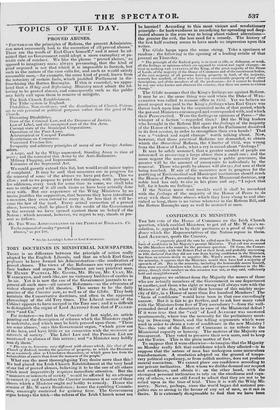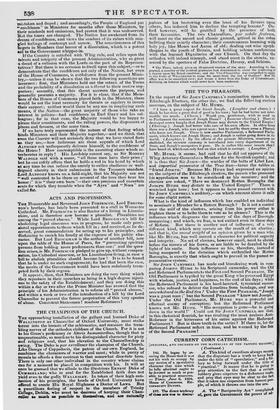CONFIDENCE IN MINISTERS.
THE late vote of the house of Commons on the Irish Church question, which enabled Ministers to get rid of Mr. WARD'S re- solution, is ,appealed to by their partisans as a proof of the confi- dence which the Representatives of the Nation repose in them. Lord ALTHORP, quoth the Courier, expressly placed the vote he called upon the House to give, on the basis of confidence in his Majesty's present Ministers. That call was answered by WU Members who voted for the previous question. Of them, the Conser- vatives, certainly, with Sir Robert Peel at their head, and probably amounting to RA declared that they did not vote from having confidence in the Ministers, but from an anxious desire to negative Mr. Ward's motion. Adding them to the minority, it appears that the Ministers would then have had a majority of upwards of 50. lint in the minority, including the honourable mover himself, there were several Members who have, and who express confidence in the Mi- nistry, though their conduct on this occasion was not, as they said, sufficiently bold and straightforward."
But suppose we subtract from the Majority the names of those who are actually members of the Government in one department or another,and those who right or wrong will always vote with the Minister of the day, what will then become of this mighty majo- rity of' fifty, in a House of more than five hundred Members? The "basis of confidence " would have been in that case exceedingly narrow. But it is fair to go further, and to ask how many voted with the Ministers from fear of Tory ascendancy ?—from the well- grounded dread of a dissolution in case of the Ministerial defeat? If it were true that the "call" of Lord ALTHORP was answered spontaneously, where was the necessity for the preliminary meet. ing in Downing Street, and the telling arguments which were used in order to obtain a vote of confidence in the new Ministry? No—this vote of the House of Commons is no tribute to the Ministerial capacity or honesty. The motives of the Majority are transparent. They voted to preserve their own seats, and to keep out the Tories. This is the plain matter of fact.
To suppose that it were otherwise—to imagine that the Majority on Monday really felt that confidence which they affected—is to suppose that the nature of men has undergone some miraculous transformation. A resolution adopted on the ground of tempo- rary political expediency, or from selfish motives, does not produce mental conviction. We cannot place our confidence according to our private inclination. Men whom we dislike demand our respect and confidence, and obtain it: on the other hand, with the strongest personal inclination to rely on the steadiness and capa- city of others, we are still forced to admit that they are not to be relied upon in the time of trial. Thus it is with the Whig Mi- nistry. Never, perhaps, since the world began did national pre- judice run so strong in the favour of any set of men, as it ran in theirs. It is extremely disagreeable to find that we have been mistaken and duped ; and accordingly, the People of England put " con fidence " in Ministers for months after those Ministers, by their misdeeds and omissions, had proved that it was undeserved. But the times are changed. The Nation has awakened from its dream of confidence, and views the conduct of its rulers with min- gled feelings of contempt and sorrow. The consciousness of this begets in Members that horror of a dissolution, which is a potent aid te the Government whipper-in. If the Country is satisfied with Whig rule, and relies upon the talents and integrity of the present Administration, why so great a dread of a collision with the Lords on the part of its Represen- tatives? But there is no occasion to dwell upon this subject,—or to demonstrate that the confidence not only of the Nation, but even of the House of Commons, is withdrawn from the present Minis- try,—unless it can be shown that the two following assertions are incorrect: first, that Ministers hold out the return of the Tories and the probability of a dissolution as a threat to their restive sup- porters ; secondly, that this threat answers the purpose, and generally procures a majority. For it is clear, that if the Mem- bers of the House of Commons placed faith in the Ministry, there would be not the least necessity for threats or cajolery to insure their support; neither would there be any use in employing such Means, if the Nation—the great majority of those who take an interest in politics—had confidence in Earl GREY and his col- leagues; for in that case, the Majority would be too happy to please their constituents, and the ruling powers, the dispensers of places and favours, at the same time. If we have truly represented the nature of that feeling which binds Ministers and their Majority together,—and we think that even the Courier will not seriously deny that we have stated facts as they are,—how ludicrous are those appeals of which Lord ALTHORP not unfrequently delivers himself, to the confidence of the Rouse! How contemptible is the assenting cheer which re- verberates in reply ! His Lordship cannot say, as Sir ROBERT WALPOLE said with a sneer, "all those men have their price ;" but he can safely affirm that he holds a rod in his hand by which at any time he can reduce the unruly to sullen obedience or well- feigned alacrity in their submission to the Treasury mandate. Lord ALTHORP knows on a field-night, that his Majority are not "well contented to be there on account of the love they bear his house:" it is "their own barn "—their own precious and uncertain seats for which they tremble when the "Ayes" and "Noes" are tidied foe.























 Previous page
Previous page